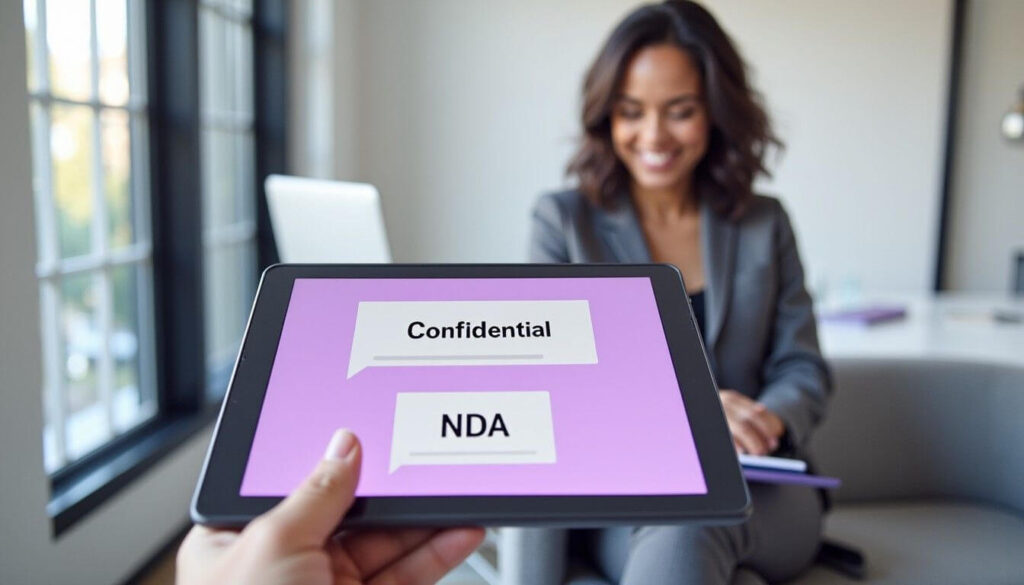
We've helped businesses save $55m with our all-in-one platform. Get instant access to this template and 115+ others, plus AI-powered document creation, starting completely free.
Are you looking to protect your business's confidential information? Understanding non-disclosure agreements is essential for safeguarding your intellectual property and maintaining your competitive edge. Whether you're sharing sensitive data with employees, contractors, or potential business partners, a properly crafted non-disclosure agreement provides the legal protection you need in today's information-driven market.
In this comprehensive guide, we'll explore everything you need to know about non-disclosure agreements in Australia, from the different types and essential elements to current legal requirements and best implementation practices. We'll also show you how to effectively manage your agreements to ensure they provide the protection your business deserves.
[ez-toc]
A non-disclosure agreement (NDA), also called a confidentiality agreement, is a legally binding contract between two or more parties that restricts the sharing of confidential information. The primary purpose of an NDA is to protect sensitive and proprietary information from being disclosed to unauthorised individuals or entities.
NDAs create legal obligations that prevent recipients from sharing or misusing your confidential information. When properly drafted and executed, they give you legal recourse if someone inappropriately discloses or uses your protected information. This protection is crucial for businesses of all sizes, from solo entrepreneurs with innovative ideas to large corporations with extensive intellectual property portfolios.
At Business Kitz, we've found that NDAs are particularly valuable when you're:

There are several types of non-disclosure agreements used in Australia, each designed for specific situations. Understanding the differences helps you choose the right agreement for your needs.
A unilateral (or one-way) NDA is used when only one party is disclosing confidential information. The Australian Business Register and other government agencies often use this type when sharing information with service providers. This type of agreement places the confidentiality obligation solely on the recipient, making it appropriate when you're sharing your business information with contractors, consultants, or potential investors.
A mutual (or bilateral) NDA is appropriate when both parties exchange confidential information. According to IP Australia, mutual NDAs are common in business negotiations, joint ventures, and partnerships where both sides need to share sensitive information to evaluate a potential deal.
Employee NDAs are specifically designed to protect confidential information in the employer-employee relationship. The Fair Work Ombudsman recommends having clear confidentiality provisions in employment contracts. These agreements typically cover customer information, business strategies, and trade secrets that employees encounter during their employment.
Partner NDAs protect confidential information exchanged between business partners, distributors, or joint venture participants. These agreements are essential when forming strategic alliances where both parties contribute valuable intellectual property or business intelligence.
When confidential information needs to be disclosed to third parties such as vendors, suppliers, or consultants, a third-party NDA provides necessary protection. These agreements often include specific limitations on how the information can be used and stored.
Our contract generator makes it easy to create the perfect NDA for your specific situation, regardless of which type you need.
For a non-disclosure agreement to be effective and enforceable in Australia, it must contain certain key elements. Here's what your NDA should include:
Clearly defining what constitutes confidential information is crucial. Your NDA should specify the types of information covered, which may include:
It's best to describe why you're sharing information without specifying the confidential information in the agreement. For example, stating "The purpose of this NDA is to discuss a potential business partnership" rather than revealing specific details.
Your NDA must clearly outline what the recipient can and cannot do with the confidential information. These obligations typically include:
To ensure enforceability, your NDA should include standard exclusions from confidentiality obligations. The Australian Securities and Investments Commission recognises that certain information cannot be kept confidential, including:
Your NDA should specify how long the confidentiality obligations last. In Australia, the duration must be reasonable and appropriate to the nature of the information being protected. While some NDAs have indefinite terms, market practice is converging on one to three years for most business purposes.
Include clear consequences for breaching the agreement. These may involve:
At Business Kitz, our document library includes professionally crafted NDA templates with all these essential elements, saving you time and ensuring your agreements meet Australian legal requirements.

To ensure your non-disclosure agreement is legally binding and enforceable in Australia, you need to understand the current legal framework. Here's what you need to know:
NDAs in Australia are governed by contract law principles. For an NDA to be legally binding, it must contain the essential elements of a valid contract:
NDAs must be clear, reasonable, and not contrary to public policy. Courts may refuse to enforce NDAs that are excessively broad or unreasonable in their restrictions.
For your NDA to be enforceable, it must be:
The Office of the Australian Information Commissioner emphasises that NDAs must comply with privacy laws when they involve personal information. This adds another layer of compliance requirements for businesses.
While there's no maximum legal time limit for NDAs in Australia, courts may scrutinise very long or indefinite confidentiality periods. The enforceability of your NDA may be questioned if the duration is deemed unreasonable given the nature of the information being protected.
Recent trends in Australia show increased scrutiny of NDAs that may conceal workplace misconduct, particularly sexual harassment. The Australian Human Rights Commission has highlighted concerns about NDAs being used to silence victims and hide systemic issues.
Additionally, courts are increasingly considering the public interest when evaluating the enforceability of NDAs. Information that reveals illegal activity, public safety issues, or matters of significant public concern may not be enforceable under confidentiality agreements.

Knowing when and how to implement non-disclosure agreements effectively is just as important as having a well-drafted document. Here are the best practices for Australian businesses:
Timing is critical when implementing NDAs. Always have NDAs signed before sharing any confidential information. You should have an NDA in place:
In today's business environment, managing NDAs digitally streamlines the process and provides better security. Best practices include:
Our document vault provides a secure solution for storing and managing your NDAs, ensuring they're accessible when needed while maintaining appropriate security.
Having an NDA is only effective if you monitor compliance and enforce it when necessary:
Remember that enforcement typically requires you to demonstrate that:
Understanding how NDAs work in real-world scenarios helps illustrate their importance and application. Here are common examples:
When exploring potential business partnerships, acquisitions, or investments, NDAs protect your sensitive information. For example, if you're seeking investment for your startup, an NDA ensures that potential investors can't share your business plan, financial projections, or proprietary technology with competitors.
According to the Australian Small Business and Family Enterprise Ombudsman, NDAs are particularly important for small businesses engaging with larger partners or investors, as they help level the playing field and protect valuable intellectual assets.
Employees often have access to sensitive business information, from customer lists to trade secrets. An employee NDA clearly defines what information must be kept confidential during and after employment.
The Fair Work Commission recommends that employment contracts include clear confidentiality provisions to protect business interests while respecting employee rights.
At Business Kitz, we've created templates that strike this balance effectively, protecting your business without imposing unreasonable restrictions on your team members. Our employee agreement templates include appropriate confidentiality provisions tailored to different employment scenarios.
In Australia, the duration of an NDA is determined by the agreement itself. While there's no legal maximum, the term should be reasonable given the nature of the information being protected. For most business purposes, 1-3 years has become standard practice, though some NDAs may have longer or even indefinite terms for trade secrets or other highly sensitive information.
Yes, properly drafted and executed NDAs are legally binding in Australia. As with any contract, NDAs must meet the essential requirements of contract law to be enforceable, including offer, acceptance, consideration, intention to create legal relations, and certainty of terms. Courts generally uphold NDAs when they're reasonable in scope and duration.
While an Australian NDA can include provisions covering international activities, enforcement across borders can be challenging. The agreement should specify which country's laws govern the document. When dealing with international parties, it's advisable to consult with legal professionals familiar with both jurisdictions to ensure the NDA provides adequate protection.
If someone breaches your NDA, you may be entitled to legal remedies, including:
The specific remedies available depend on the terms of your NDA and the circumstances of the breach.
Protecting your confidential information is essential in today's competitive business environment. Non-disclosure agreements provide a crucial legal framework for sharing sensitive information while maintaining control over how it's used and distributed.
By implementing well-drafted NDAs and following best practices for their management, you create a strong foundation for protecting your intellectual property, trade secrets, and other valuable business information. This protection gives you the confidence to explore new partnerships, hire the right talent, and grow your business without unnecessary risk.
At Business Kitz, we understand the importance of managing business documents efficiently and securely. Our platform provides all the tools you need to create, store, and manage your NDAs and other important business documents in one place. For more complex legal situations requiring tailored advice, our sister company Legal Kitz offers expert legal counsel to ensure your confidentiality agreements provide maximum protection under Australian law.
Sign up for a free Business Kitz account today to access our comprehensive library of document templates, secure document vault, and contract generator.
Copyright © 2025 Business Kitz 14312161